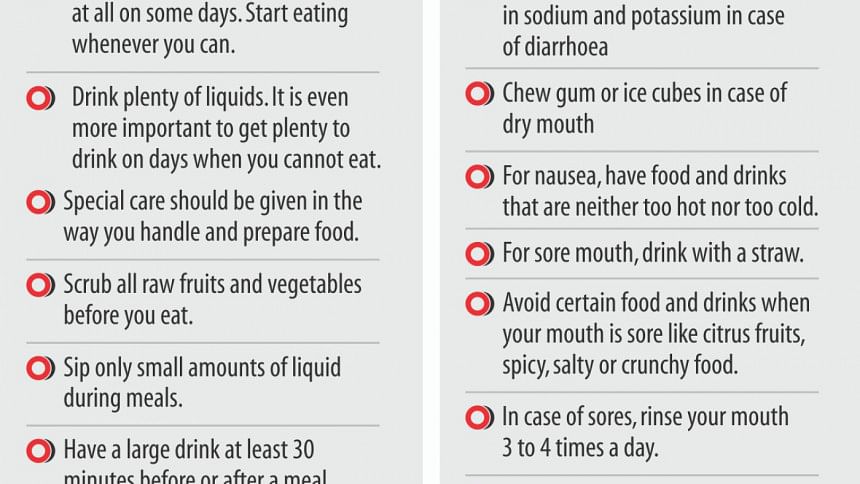Food boosting the cancer fight

Cancer treatments are designed to kill cancer cells. But this treatment can also damage healthy cells, which can cause eating problems. Common eating problems during cancer treatments include appetite loss, change in sense of taste and smell, constipation, diarrhoea (caused by radiation therapy), bloating, cramps, dry mouth (chemotherapy and radiation therapy can damage the gland that makes saliva which ultimately causes dry mouth), lactose intolerance caused by radiation therapy, nausea, sore mouth, sore throat and trouble swallowing, vomiting, weight gain, weight loss.
High fat diet has been associated with cancer of the uterus, breast prostate and colon. The regular excessive intake of kcal is associated with cancer of the gallbladder and endometrium.
On the positive side, diet rich in fibre helps to protect against colorectal cancer. Vitamin C rich food may help protect against the cancer of stomach and oesophagus. Vitamin A and carotene may protect against cancer of lung, bladder and larynx. Fruits and vegetables have an abundance of phytochemicals so it is advised to eat five or more servings of fruits and vegetables per day. Legumes such as soybean, dried bean and lentils may protect against cancer. High intakes of soy foods are associated with a decreased risk of breast and colon cancer. Carrots, tomato and other food rich in carotene and lycopene may reduce the risk of ovarian cancer.
One of the first indications of cancer is unexplained weight loss because the tumor cells use, for their own metabolism and development, the nutrients that the host has taken in. Loss of muscle tissue and Hypoalbuminemia with anaemia. Cancer patients become satiated earlier than normal, because of decreased digestive secretion.
Despite the nutritional need, anorexia is a major problem for cancer patients. It is particularly difficult to combat because cancer patients tend to develop strong food aversions that are thought to be caused by the effect of chemotherapy. So it is preferable that chemotherapy be withheld for 2 or 3 hours before and after meals.
Kilocalorie needs will vary from patient to patient. But 45 to 50 kilocalorie /kg body weight may be recommended. Carbohydrate and fat will be needed to provide this energy. Cancer causes an increase in the metabolic rate, tissue must be rebuilt, and the nutrient lost to the cancer must be replaced. Patients on high protein and high kilocalorie diet tolerate the side effect of therapy and higher doses of drugs. Patients with good nutritional status will need from 1 to 1.2 gm of protein per kg of body weight. Malnourished patients may need from 1.3 to 2.0 gm of protein/kg body weight/day. Vitamins and minerals are essential for metabolism and tissue maintenance. The recommendation is to eliminate vitamin A and vitamin E in supplemental form which may prevent cancer cells from self-destructing and work against cancer therapy. Fluids are important to help the kidney eliminate the metabolic waste and the toxins of the drugs. Several small meals are better than 3 large meals. It is preferable to serve the nutritionally richer meal early in the day because the patient is less tired and may have a better appetite at that time.
Chowdhury Tasneem Hasin
Chief Nutritionist United Hospital Ltd.
Organizational and Press Secretary,
Association of Nutritionist and
Dieticians (AND)

 For all latest news, follow The Daily Star's Google News channel.
For all latest news, follow The Daily Star's Google News channel. 



Comments